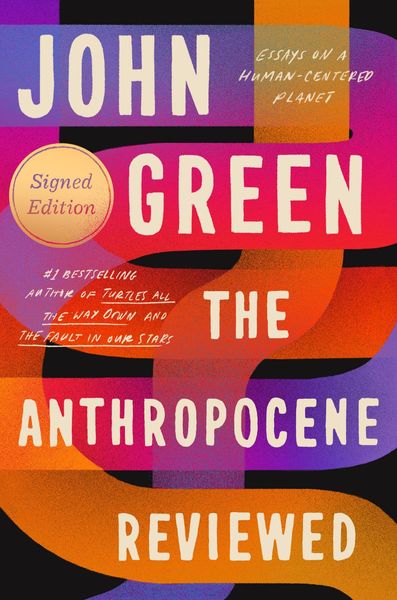
The Anthropocene Reviewed (Signed Edition) Essays on a Human-Centered Planet
The Anthropocene is the current geological age, in which human activity has profoundly shaped the planet and its biodiversity. In this ... symphony of essays adapted and expanded from his ... podcast, bestselling author John Green reviews different facets of the human-centered planet on a five-star scale--from the QWERTY keyboard and sunsets to Canada geese and Penguins of Madagascar"
Reviews
Ashley Denktas@foxface
katie h.@caterhine
jen@seastruck
Roseanne@croissaintwink
Emma Lechner@emmyofthevalley
Harlee K@harleemai
Ani Velasquez@aniruokay
Eduardo Sorribas@sorribas
Alli@maybeitsalli
Gelaine Trinidad@gelaine
Megan Parrott@meganparrott
Andrea Morales@matchandrea
lala@polijus
Elisavet Rozaki @elisav3t
Matthew Soeder@m-soeder
amy @leech
wen@sheisnototter
chloe rae@heychloerae
Ashleigh Izaguirre@ashleighmae
Noah Cross@noahwcross
Jackie Lu@jzrlu
Jun Angelo Cabuguas@junjello321
Ally@allygatr
rita@nomnomriir
Highlights
Ralie Sutton@ralie
Madelaine Jarcew@lalalaine
Page 193
Madelaine Jarcew@lalalaine
Page 7
jen@seastruck
Page 243
jen@seastruck
Page 253
jen@seastruck
Page 252
jen@seastruck
Page 252
jen@seastruck
Page 219
siv@lossiv
Iris van der zanden@irisvdz
Page 145
🍵@jaswang
Page 220
🍵@jaswang
Page 163
🍵@jaswang
Page 99
camille leung@cami11e
camille leung@cami11e
camille leung@cami11e
camille leung@cami11e
camille leung@cami11e
camille leung@cami11e
camille leung@cami11e
camille leung@cami11e
camille leung@cami11e
camille leung@cami11e
camille leung@cami11e